To Adrian M. Conan Doyle
in the humble hope
that this book for boys and girls
will be a bridge
to Mr. Sherlock Holmes himself
|
BASIL..........an English mouse detective |

Original Text by Eve Titus.
Original Illustrations by Paul Galdone.
© Pocket Books, 1958
Text posted on Basil's Pastiche Parlour.
Unoffical re-print posted on the PR Forum on 25 January 2001
Re-publication for this GMD site 20 February 2001
Special thanks to The Mouse Queen for taken the time to type this entire book and posting it on the forum, in order to share wonderful literature and love for a particular pint-sized detective.
(Editor's Note: Written text is copyright of the author, Eve Titus. Images are copyright of the illustrator, Paul Galdone. Reprinted without permission, for educational use only.)
To Adrian M. Conan Doyle
in the humble hope
that this book for boys and girls
will be a bridge
to Mr. Sherlock Holmes himself
|
BASIL..........an English mouse detective |

The Mystery of the Missing Twins could never have been solved by an ordinary detective.
But Basil, of course, was far from ordinary. Even before the kidnappers’ note came, his keen mind had deduced what the criminals really wanted.
"Mark my words," he told me, "the disappearance of Angela and Agatha is only the beginning. The criminals plan to strike at all of us!"
He was quite right. But there was a long and dangerous road to be travelled before the pieces of the puzzle fell into place.
Who masterminded the plot? What was the motive behind it? How were the twins lured away?
And Basil -- what sort of sleuth was he?
To make these matters clear, I shall tell you something of his amazing career as a detective, and then relate the events leading up to the crime.
The place is London, in the year 1885....
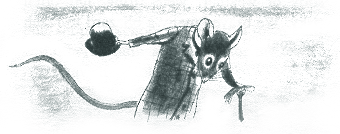 Pray allow me to introduce myself. I am Dr. David Q. Dawson, Basil’s close friend and associate.
Pray allow me to introduce myself. I am Dr. David Q. Dawson, Basil’s close friend and associate.
Basil was as famous a detective in our world as was Mr. Sherlock Holmes in the world of people.
This came about because he studies at the feet of Mr. Holmes himself, visiting him regularly in his rooms at Baker Street, Number 221B.
I usually went along. We would scurry up to the sitting room shared by Sherlock and Dr. John H. Watson. Well-hidden, we would then listen closely as Mr. Holmes told his friend exactly how he solved his cases.
Thus Basil learned the scientific side of sleuthing from the best teacher of them all.
Mr. Holmes was tall and thin, with sharp piercing eyes. And if ever a mouse may be said to resemble a man, then Basil was the mouse!
He even dressed like his hero, thanks to a clever little tailor who copied Sherlock’s wardrobe almost exactly.
But the long trips to Baker Street, in all sorts of weather, were tiring and often risky. We braved many a blizzard to reach our goal.
One evening, leaving by way of the cellar, Basil stopped so suddenly that I almost bumped into him.
"Observe, my dear doctor," he remarked, pointing with his walking stick. "Observe how clean and spacious is this cellar. What a far cry from our crowded, dingy dwellings in the East End!"
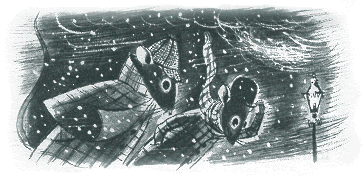 His eyes lit up. "We could build a town here. Picture a row of cosy flats on that empty shelf next to the front windows -- plus shops, a school, a library, a town hall, and other buildings. A name for the town? Ah, I have it -- Holmestead!"
His eyes lit up. "We could build a town here. Picture a row of cosy flats on that empty shelf next to the front windows -- plus shops, a school, a library, a town hall, and other buildings. A name for the town? Ah, I have it -- Holmestead!"
"A brilliant idea, Basil! Best of all, we could steal upstairs to listen to our beloved Sherlock as often as we pleased."
"Precisely," said my companion, smiling. "We shall put it to a vote at our next town hall meeting."
The forty-four families in our community approved.
Basil drew up the plans. Carpenters travelled to Baker Street night after night, working at breakneck speed, and within two weeks the move was made.
Holmestead was a model town, and mice from all over London came to look and to marvel.
The flat Basil and I shared fronted the street, so that we could see our callers before they entered, just as Mr. Holmes did.
Basil listened long and often to the master, and it soon seemed as though there were no mystery too tangled for him to unravel.
Mice journeyed long distances to consult him, even French mice from across the Channel. Rich or poor, no one in need of help was ever turned from his door.
He brought so many criminals to justice that evildoers trembled at the mere mention of his name.
Then, but one month after we had moved to Baker Street, the strangest case of Basil’s career began.
Angela and Agatha, our neighbours’ young twins, vanished into thin air!
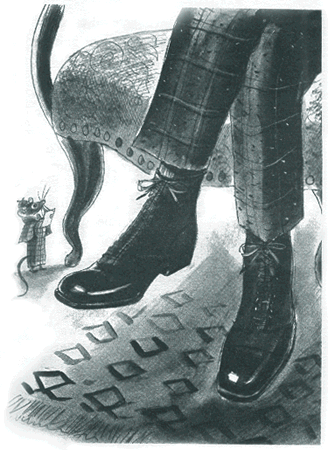 When the twins’ parents came to our rooms late at night, seeking Basil’s help, we were upstairs.
When the twins’ parents came to our rooms late at night, seeking Basil’s help, we were upstairs.
Unnoticed, we sat in our favourite corner, listening with deep interest.
Mr. Holmes was telling Dr. Watson in detail exactly how he had solved a jewel burglary that had completely baffled Scotland Yard.
Basil whipped out his notebook and jotted down every word, scribbling rapidly in shorthand, or perhaps I should say shortpaw.
"What sheer genius!" he whispered. "What a brain! That man will become a legend -- his fame has spread to the far corners of the earth."
"You are something of a legend yourself," said I.
"Perhaps, Dawson, but I still have much to learn. What an honour it is to study under Sherlock Holmes!"
To which I answered, "And what an honour for me to be associated with the Sherlock Holmes of the Mouse World!"
Basil bowed modestly and resumed taking notes.
About an hour or so later, Mr. Holmes took his violin from its case. He put a new E string on the instrument, discarding the old one in the wastebasket.
Then he lifted his bow and dashed off a piece by Paganini. We were all ears, for he played it magnificently.
"Bravo!" squeaked Basil, quite carried away.
Next, we heard a Mendelssohn piece, requested by Dr. Watson, after which the two men retired to their bedrooms.
Basil took the E string from the basket, and we scurried silently across the floor to our secret passageway.
I should mention here that my friend had made one very strict rule when we moved to Baker Street. The rule was laid down because he did not wish to risk disturbing his hero in any way whatsoever.
It stated that only Basil and myself were allowed upstairs -- no other mouse was even to venture near our passageway. It was therefore with great surprise that we saw someone hurrying to meet us. It was Mrs. Judson, our mousekeeper.
 She was considerably upset. "Oh, Mr. Basil," she wailed, "I know I’m breaking the rule, but this is an emergency! The Proudfoots, your neighbours, have been waiting in your rooms for an hour. And Mrs. Proudfoot hasn’t stopped crying since the moment she came. I just had to fetch you!"
She was considerably upset. "Oh, Mr. Basil," she wailed, "I know I’m breaking the rule, but this is an emergency! The Proudfoots, your neighbours, have been waiting in your rooms for an hour. And Mrs. Proudfoot hasn’t stopped crying since the moment she came. I just had to fetch you!"
"Pray calm yourself, and tell us what has occurred," said Basil kindly.
"Angela and Agatha have disappeared!"
"That’s odd," I remarked. "However, the twins are known to be mischievous. No doubt it is a childish prank of some sort."
"I hardly think so," said Basil. "The hour is far too late for that. It bears looking into -- let’s hurry our steps a bit."
Mrs. Judson’s apron strings bobbed back and forth as she ran on ahead, and in a matter of minutes we reached our rooms.
I was shocked by the change in Mrs. Proudfoot. She was an attractive white mouse, who usually looked gay and youthful. Now her red-rimmed eyes and tear-swollen face made her seem years older.
As Basil strode into the sitting room, she sprang from her chair and clutched at his lapels.
"Our twins are missing! They vanished on the way home from school. What dreadful thing can have happened to them? A mousetrap, perhaps? Oh, my poor dears -- where can they be?"
She sank back on the sofa, sobbing. I took a bottle of smelling salts from my little black bag, and waved it under her nose.
The father stood silently by, with a look of extreme suffering on his face.
Basil opened his notebook. "Your wife is much too upset to talk. Will you tell me all you know?"
Mr. Proudfoot braced himself. "I shall try, sir. Angela and Agatha never return home from school later than four o’clock. Now it is past eleven at night, and we are at our wits’ end! You know the twins -- they are happy, contented children, and contented children do not run away from home."
"You are right on that point, Mr. Proudfoot. Have you questioned their schoolmates?"
"Yes. They said the twins had planned to stop at the sweetshop on their way home from school. They do this often, for they have an especial fondness for chocolates. That’s where most of their allowance goes. But when he spoke to the sweetshop proprietor, he said they hadn’t arrived there this afternoon."
"Do you trust the proprietor?" asked Basil.
"Mr. Hume is one of the most honest mice I know."
"H’m. Then we can eliminate him as a suspect. One last question -- what were the twins wearing?"
 "You’ll have to ask my wife that."
"You’ll have to ask my wife that."
"Pretty pink pinafores," said Mrs. Proudfoot tearfully. "My precious darlings always looked so sweet in pink, with their little white faces--"
Basil patted her shoulder. "I can offer you only crumbs of comfort now. But rest assured that I shall do all in my power to restore your twins to you. For your own sake, go home and try to get some sleep."
She leaned heavily on her husband as they walked to the door. Mr. Proudfoot turned around.
"You are the only one who can help us. You will find them, won’t you?"
"My investigations begin at once," replied the detective. "I hope to have news soon -- good news."
As soon as they had gone, he said, "My first step in the Mystery of the Missing Twins will be to hunt for clues. Come along, my dear doctor, and bring a candlestick---we’re off to the sweetshop!"
It was well past midnight. A tiny night light glowed in the windows of the closed shop, the last in the row. Holmestead ended there. Beyond lay the blackness of the cellar, vast and menacing.
Basil paced back and forth, pondering the problem.
"If I remember rightly, there should be an emergency exit ten yards ahead."
"There is, Basil. But it is in the darkest part of the cellar, and no one ever goes there."
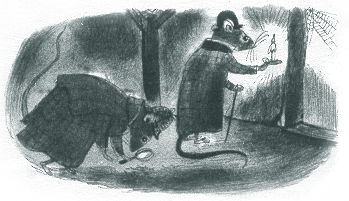 He gripped my arm. "Then we shall be the first! There may be clues. Light the candle, Dawson."
He gripped my arm. "Then we shall be the first! There may be clues. Light the candle, Dawson."
I did as he asked. He took out his pocket magnifying glass and peered through it, stooping low as he moved slowly toward the door. Not one inch of ground escaped his sharp eyes.
I was surprised to find that the emergency door was wide open.
Basil studied the pavement. "Ah! The dust here has been recently disturbed."
Flinging himself full length upon the ground, he used his lens both inside and outside the door.
"Dawson, this dust has a story to tell. There are three sets of big footprints, and two sets of little ones. The owner of one big set went inside, as far as the sweetshop, while his friends waited outside. There are no signs of a struggle here. The small footprints followed the big ones willingly!"
His face was stern as he rose to his full height.
"The twins have always been warned not to talk to strangers. Picture the pair on their way to the sweetshop, sad because it is near the end of the week and their allowance is almost gone. Just beyond the shop stands a smiling stranger, in whose outstretched paws they see something most tempting -- French chocolates! He beckons and they follow, completely forgetting their parents’ warnings!"
He closed the door. "There is nothing more we can learn here."
Back in our rooms, Basil filled his berrywood pipe and curled up in an easy chair, deep in thought.
I skimmed the pages of the London Mouse Daily.
At last Basil spoke. "A sinister plot has been hatched by a daring band of criminals. It cannot be money they want, for the Proudfoots have scarcely a crumb to their name!
"Mark my words, Dawson -- this gang is after something more important to them than money. What it may be, we have yet to learn. Kidnappers usually send a note. I expect they will get in touch with us soon, possibly tomorrow."
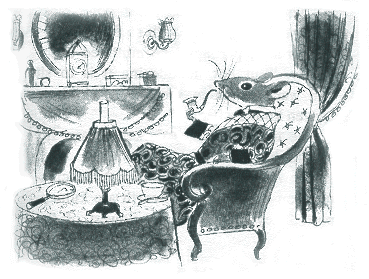 Unwinding his long legs, he strode over to the wooden mantelpiece where he stood staring at his treasured collection of Holmes souvenirs.
Unwinding his long legs, he strode over to the wooden mantelpiece where he stood staring at his treasured collection of Holmes souvenirs.
There were scraps of paper his hero had written upon, old pen points he had used, a torn blotter, a broken pocket lens, a whittling of Holmes done by Basil himself, and other odds and ends.
"No doubt the master would have solved this case by now," said my companion glumly.
"Not even he could have done more than you have, Basil, with so few clues."
"Perhaps, perhaps," he muttered impatiently. "But how maddening it is to sit and wait! Think of those poor children, heaven knows where--"
The detective’s face darkened, and his eyes flashed fire.
"Dawson, the most contemptible creatures on the face of this earth are kidnappers! They are indeed the lowest of the low!"
All the next morning Basil lounged about in his Persian robe, his mood one of blackest gloom.
Mr. Proudfoot called upon us. Basil told him he was awaiting word from those responsible for the twins’ disappearance.
"Then it’s as I feared," said the father grimly. "Angela and Agatha have been kidnapped!"
"That is what the clues indicate," the detective admitted. "However, I promised to bring them back unharmed, and I shall."
Mr. Proudfoot brightened, "I’ll repeat your words to my wife. We have the utmost faith in you."
After lunch, Basil took out the block of wood he was whittling into a violin. He had been working on it for some weeks.
As he whittled I could tell that his keen brain was busy with the clues he had thus far uncovered.
At one point he announced, "I believe I have deduced what the criminals want. If I am right, our town’s entire future is in peril! Ask me nothing now. I shall learn whether my suspicions are correct when the kidnappers’ note arrives."
I had a hundred questions, but kept silent, continuing to read Mouse About Town, a library book.
From time to time the doorbell rang. Mrs. Judson answered, and I could hear children inquiring after the twins. She said sadly that there was no news.
The day dragged on. Late in the afternoon, Basil held up the finished violin, a fine piece of work.
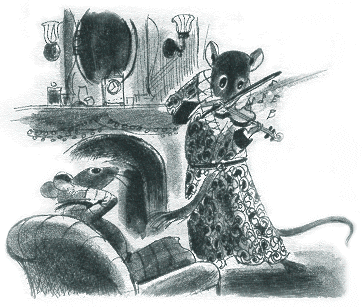 He snipped off part of the E string taken from Mr. Holmes’ basket, and put it on his own instrument.
He snipped off part of the E string taken from Mr. Holmes’ basket, and put it on his own instrument.
"Now that I have all four strings, I , too, shall make music. I studied the violin many years ago and must surely remember a little of what I learned."
"I hope so, Basil. Nothing pains me more than badly played music!"
He bowed his head. "I shall do my best."
But alas, he attempted the difficult Paganini piece Mr. Holmes had played the night before. Terribly out of practice, he struck so many wrong notes that I put my paws to my ears!
"In heaven’s name, stop! For my sake and for poor Paganini’s too -- we are suffering!"
He twanged one of the strings.
"My dear doctor, be comforted by the thought that these strings are made of cat-gut!"
Chuckling, I rang for Mrs. Judson, who soon bustled in with our tea.
Holding my cup, I strolled over to the window.
Baker Street was covered with ice. Walking was unsafe, and the street was practically deserted.
Suddenly I saw a plump, middle-aged mouse slipping and sliding along, squinting up at the house numbers.
"Basil, there’s a strange mouse outside."
He rushed over and drew aside the lace curtain.
"Aha! Our long wait is over. Unless I am much mistaken, this is the messenger from the kidnappers!"
The loud clanging of the bell was welcome music to our ears, and we hastened to answer it ourselves.
Upon the doorstep stood the tubby mouse. His corduroy jacket was old and baggy, and its collar was turned up against the cold.
He removed his shabby cloth cap and began to twirl it nervously, shuffling his feet back and forth.
"Beggin’ your pardon, sirs, but which one o’ you is Mr. Basil, the detective?"
"I am he. Pray state your business."
 The messenger reached in his pocket. Out came an old toy kitten minus its tail. He crammed this back into his pocket and then drew out a blue envelope.
The messenger reached in his pocket. Out came an old toy kitten minus its tail. He crammed this back into his pocket and then drew out a blue envelope.
"I was told to give you this, Mr. Basil."
"And by whom, may I inquire?"
Cold as it was, beads of sweat stood out on the messenger’s brow.
In great terror he said, "Please, sir, don’t be askin’ me that. I swore I wouldn’t tell! Good day."
And the plump mouse ran down Baker Street as though he were being chased by a thousand tomcats!
We stared after him. "What a pity that we learned nothing at all about him," I remarked. "It might have been of help in solving this case."
"That’s where you are wrong," replied Basil. "I already know a great deal about our mysterious messenger. What did you yourself gather?"
"Nothing much, except that he’s poor and that he’s a family mouse -- the toy kitten, you know."
"True enough," agreed my friend. "But those facts are obvious. You are not making full use of your deductive powers."
"Tell me, then," said I, somewhat annoyed at his tone, "what did you deduce?"
"He was once a sailor, he now follows the trade of carpenter, and he comes from the Northwest of England. Near the coast, I’d say. Furthermore, his initials are H.H., and he travelled here by train."
I was astounded. "But how on earth do you know all that?"
"It is really quite simple. The clues are always at hand, if one’s mind is trained to observe them.
"I immediately perceived the tiny mermaid tattooed on his wrist. And it is a proven fact that most sailors who take to land settle as near to the sea as they can get. As for his trade, did you not notice the outlines of the carpenter’s rule in his pocket? His speech betrayed his nesting place---I could not mistake those Northwest accents. His initials were in the lining of the cap he kept twirling, and he had succeeded in brushing off some of the train soot, but not quite all of it."
"Basil , you are a magician!"
"Furthermore, his marriage is most happy."
"Now you are jesting," I said. "There was no way for you to deduce that fact."
Basil’s eyebrows shot upward. "Wasn’t there? I noticed a large patch on his sleeve. It was not the work of a skilled tailor, but it was lovingly and carefully sewn. Only a devoted female relative would have gone to such pains. She must be his wife, for the toy kitten tells us he is a father."
"Amazing!" I exclaimed.
"Elementary, my dear Dawson."
We went inside and seated ourselves on either side of the flickering fire.
The blaze crackled cheerily, and the dancing flames seemed like little rays of hope. I brightened at the thought that the kidnappers might have written to say that the twins were on their way home at that very moment.
Basil unsealed the envelope and carefully removed the typewritten note inside.
Without turning a whisker, he read it aloud, slowly. I marvelled at his complete calm. As for myself, cold chills ran up and down my spine!
CONTINUE ON TO CHAPTER 6 THROUGH 10